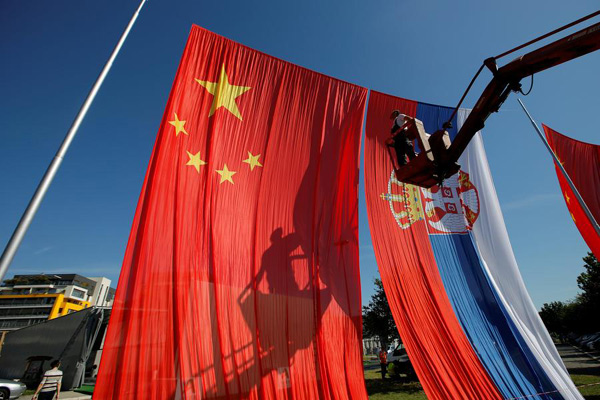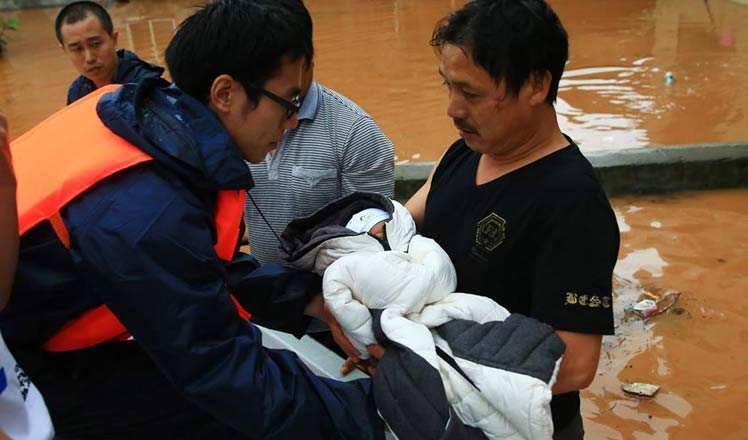Deepening ties with Belt and Road nations
Updated: 2016-06-20 08:10
By CHU YIN(China Daily)
|
||||||||
 |
|
A worker adjusts Chinese and Serbian flags for the upcoming visit of Chinese President Xi Jinping in Belgrade, Serbia, June 16, 2016. [Photo/Agencies] |
President Xi Jinping is on an eight-day visit to Serbia, Poland and Uzbekistan from Friday, during which he will also attend the meeting of the Council of Heads of State of the Shanghai Cooperation Organization in Tashkent on June 23 and 24.
High hopes have been placed on his visits to the three countries, each of which plays a significant role in the China-proposed Belt and Road Initiative and in their respective neighborhoods. Poland and Serbia are gateways to Central and Eastern Europe, and Uzbekistan is at the heart of Central Asia, where a railway connecting China, Uzbekistan and Kyrgyzstan is under construction.
The three countries' geopolitical importance has increased in the face of rising regional tensions. For one, the security risks following Crimea's inclusion into Russia and alleged involvement in the Ukraine crisis remain high and have gradually spilled over into neighboring states, including Poland.
Serbia, a key power in the Balkans, is also at the forefront of an ongoing immigration crisis as refugees from the Middle East, some of whom may be terrorists, keep flooding into Europe from its southern end.
The well-orchestrated terrorist attacks in Paris and Brussels have not only taken many innocent lives, but also highlighted the need to safeguard Europe's stability by, among other things, protecting its border areas.
Central Asia, too, is not a stranger to terrorist attacks. With terrorists and extremist ideas from the Middle East continuing to make inroads into Central Asia, the countries in the region, especially Kazakhstan and Afghanistan, face grave security threats. In the light of global governance, therefore, China has every reason to seek closer economic and strategic ties with the three countries to not only safeguard its national interests but also play a more responsible role as a major global power.
As a leader in both economic growth and industrial transformation in Central and Eastern Europe, Poland has close economic and security ties with Germany and the United States while exercising some influence on neighboring Ukraine and Belarus. This should make it a key stabilizing factor in the region against the backdrop of the Ukraine crisis.
Serbia, too, has long played a crucial security role on the Balkan Peninsula. Its importance for the security of the European Union and Turkey has doubled after the refugee crisis intensified last year.
As for Uzbekistan, it has always been a valued member of the Central Asian community as well as the Commonwealth of the Independent States.
Of course, promoting the Belt and Road Initiative is expected to top the agenda of Xi's visits to the three countries, because they have maintained time-tested partnerships with China and responded positively to the initiative.
China and Poland already have a series of agreements, ranging from heavy machinery, and port and road construction to power generation and agriculture. And we can expect many more during Xi's visit to Warsaw. The infrastructure and energy cooperation with Serbia and Uzbekistan, too, will get fresh momentum.
To include these countries in a community with shared destiny and make them pillars of the Belt and Road Initiative, however, requires more than coordination. That explains why Xi's visits to the countries carry a crucial message that China is more than willing to deepen its partnerships with nations along the Belt and Road.
The author is an associate professor at the University of International Relations, and a research fellow at the Center for China and Globalization.
- Planned Obama, Dalai Lama meeting protested
- Gravitational waves detected for second time: scientists
- 48-hour 'silence regime' starts in Syria's Aleppo
- UN Security Council adopts resolution on Libya arms embargo
- US extradites top drug lord 'El Guero Palma' to Mexico
- Houston firm joins China clean energy project

 Photographer wants people to care for endangered animals
Photographer wants people to care for endangered animals
 Iconic pagodas turn into a dreamland in infrared photos
Iconic pagodas turn into a dreamland in infrared photos
 Mass yoga events ahead of International Yoga Day
Mass yoga events ahead of International Yoga Day
 Thangka worship activity held in Lhasa
Thangka worship activity held in Lhasa
 Top 10 most valuable car brands in the world
Top 10 most valuable car brands in the world
 Floods cause havoc across south, central China
Floods cause havoc across south, central China
 Top 10 Chinese cities with highest housing rent
Top 10 Chinese cities with highest housing rent
 Polish art rediscovers its roots
Polish art rediscovers its roots
Most Viewed
Editor's Picks

|

|

|

|

|

|
Today's Top News
Abe's blame game reveals his policies failing to get results
Ending wildlife trafficking must be policy priority in Asia
Effects of supply-side reform take time to be seen
Chinese State Councilor Yang Jiechi to meet Kerry
Chinese stocks surge on back of MSCI rumors
Liang avoids jail in shooting death
China's finance minister addresses ratings downgrade
Duke alumni visit Chinese Embassy
US Weekly

|

|









